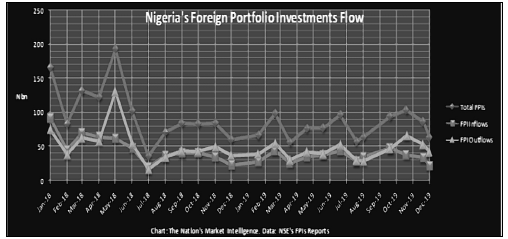Taofik Salako, Capital Market Editor
Nigeria’s foreign portfolio deficit worsened to N104.29 billion in 2019 as foreign investors offered to sell more of Nigerian assets than buying amid fears of political and macroeconomic uncertainties.
A full-year transactional report on foreign portfolio investment (FPI) at the weekend indicated that foreign portfolio investors traded less on Nigerian equities and were more on the sell side than the buy side in 2019.
Total FPI inflows in 2019 stood at N419.13 billion as against outflows of N523.42 billion, representing a net deficit of N104.3 billion. Nigeria’s FPI had slipped into negative with a net deficit of N66.2 billion in 2018 after a world-leading stock market rally left the country with a surplus of N336.94 billion in 2017. Total foreign inflows in 2018 stood at N576.45 billion compared with outflows of N642.65 billion. Foreign inflows had in 2017 outpaced outflows at N772.25 billion and N435.31 billion respectively.
The FPIs report, coordinated by the Nigerian Stock Exchange (NSE), included transactions from nearly all custodians and capital market operators and it is widely regarded as a credible measure of foreign portfolio investment (FPI) trend. The report uses two key indicators-inflow and outflow, to gauge foreign investors’ mood and participation in the stock market as a barometer for the economy.
Foreign portfolio outflow includes sales transactions or liquidation of equity portfolio investments through the stock market while inflow includes purchase transactions on the NSE. Segmental analysis delineates the proportion of foreign to local participation, institutional to retail investors as well as the momentum of activities among others.
The 12-month report for the year ended December 31, 2019 showed that total FPI transactions declined by N276.45 billion from N1.22 trillion in 2018 to N942.55 billion in 2019. Both sell side and buy side declined but the sell momentum was stronger. Total inflow dropped by N157.32 billion from N576.45 billion in 2018 to N419.13 billion in 2019 while total outflow declined by N119.23 billion from N642.65 billion in 2018 to N523.42 billion in 2019.
With the decline in FPIs, Nigerian domestic investors outstripped foreign investors as the dominant bloc in the stock market. Domestic investors accounted for 51.11 per cent of total transactions in 2019 as against 48.88 per cent by foreign investors. Foreign and domestic participation had stood at 50.70 per cent and 49.30 per cent respectively in 2018. Total transaction at the NSE had dropped from N2.40 trillion in 2018 to N1.93 trillion in 2019.
Market analysts agreed that a combination of political risk, fluctuations in the global financial markets, improved yields in the advanced markets and weak domestic macroeconomic fundamentals was the moderating factor for the year. Nigeria held its general elections in March 2019, with pre and post elections ripples beclouding the investment market.
The FPI performance impacted share pricing trend at the stock market. The Nigerian stock market closed 2019 with negative average full-year return of -14.60 per cent for the 2019 trading year, equivalent to net capital depreciation of N1.71 trillion for the year. It had recorded negative average full-year return of -17.81 per cent in 2018.
Total FPI transactions for the 12-month period ended December 31, 2018 stood at N1.219 trillion as against N1.208 trillion recorded in 2017. Total transactions at the Nigerian equities market had declined from N2.543 trillion in 2017 to N2.404 trillion in 2018. With these, foreign investors had accounted for 50.87 per cent of total transactions at the equities market in 2018 compared with 47.49 per cent in 2017.
Nigerian domestic investors had reduced their transactions to N1.185 trillion in 2018 as against N1.335 trillion in 2017, thereby accounting for 49.13 per cent of total transactions in the equities market in 2018 compared with 52.51 per cent in 2017.
Foreign investors had accounted for the largest transactions at the Nigerian stock market between 2011 and 2015 but were overtaken by domestic investors in 2016, who sustained their marginal lead in 2017. Foreign investors, however, outpaced domestic investors as the leading bloc in 2018.
Foreign transactions, which stood at N1.54 trillion in 2014, had declined considerably to N518 billion in 2016, before making a remarkable recovery to N1.208 trillion in 2017. Conversely, domestic investors, which had traded a high of N3.55 trillion in 2007, had shown considerable slowdown over the past 12 years, dropping by 66.67 per cent to N1.185 trillion in 2018.


